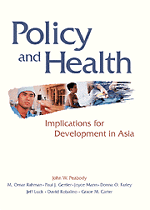Book contents
- Frontmatter
- Foreword
- Preface
- Contents
- Tables
- Figures
- Boxes
- Chapter One OVERVIEW: THE ROLE AND RESPONSIBILITY OF GOVERNMENTS IN THE HEALTH SECTOR
- Chapter Two EVIDENCE-BASED POLICY: USING DATA TO INFORM POLICY AND IMPROVE HEALTH OUTCOMES
- Chapter Three PRIORITIZING MEDICAL INTERVENTIONS: DEFINING BURDEN OF DISEASE AND COST-EFFECTIVE INTERVENTIONS IN THE PURSUIT OF UNIVERSAL PRIMARY CARE
- Chapter Four FINANCING AND ALLOCATING PUBLIC EXPENDITURES: LEVERAGING PUBLIC RESOURCES TO MEET OBJECTIVES AND INCREASE PRIVATE PARTICIPATION
- Chapter Five TOWARD BETTER EQUITY AND ACCESS: PERSISTENT POVERTY, INADEQUATE INTERVENTIONS, AND THE NEED FOR BETTER DATA AND SOLUTIONS
- Chapter Six GOVERNMENT AND THE IMPROVEMENT OF HEALTH BEHAVIORS
- Chapter Seven IMPLEMENTING POLICY OBJECTIVES: THE ROLE AND RESPONSIBILITIES OF THE MINISTRY OF HEALTH
- Acronyms
- Data Notes and Glossary—Chapter Two
- References
- Authors
- Index
- Plate section
Chapter Five - TOWARD BETTER EQUITY AND ACCESS: PERSISTENT POVERTY, INADEQUATE INTERVENTIONS, AND THE NEED FOR BETTER DATA AND SOLUTIONS
Published online by Cambridge University Press: 18 December 2009
- Frontmatter
- Foreword
- Preface
- Contents
- Tables
- Figures
- Boxes
- Chapter One OVERVIEW: THE ROLE AND RESPONSIBILITY OF GOVERNMENTS IN THE HEALTH SECTOR
- Chapter Two EVIDENCE-BASED POLICY: USING DATA TO INFORM POLICY AND IMPROVE HEALTH OUTCOMES
- Chapter Three PRIORITIZING MEDICAL INTERVENTIONS: DEFINING BURDEN OF DISEASE AND COST-EFFECTIVE INTERVENTIONS IN THE PURSUIT OF UNIVERSAL PRIMARY CARE
- Chapter Four FINANCING AND ALLOCATING PUBLIC EXPENDITURES: LEVERAGING PUBLIC RESOURCES TO MEET OBJECTIVES AND INCREASE PRIVATE PARTICIPATION
- Chapter Five TOWARD BETTER EQUITY AND ACCESS: PERSISTENT POVERTY, INADEQUATE INTERVENTIONS, AND THE NEED FOR BETTER DATA AND SOLUTIONS
- Chapter Six GOVERNMENT AND THE IMPROVEMENT OF HEALTH BEHAVIORS
- Chapter Seven IMPLEMENTING POLICY OBJECTIVES: THE ROLE AND RESPONSIBILITIES OF THE MINISTRY OF HEALTH
- Acronyms
- Data Notes and Glossary—Chapter Two
- References
- Authors
- Index
- Plate section
Summary
OVERVIEW
One of the key roles of government in the health sector we outlined in Chapter 1 is promoting equity or remedying inequities by improving access to health care. As we saw in Chapters 3 and 4, ensuring equity involves both the delivery of health care—governments need to prioritize interventions, and the financing of health care—governments need to put policies in place that enable individuals to afford those interventions.
Over the past three decades, Asian governments have made a concerted effort to improve access to health care. Many countries invested in facility infrastructure and health manpower to extend direct public provision of free or low-priced services to poor urban neighborhoods and rural areas (e.g., Indonesia, India, Papua New Guinea, the Philippines, and Sri Lanka). Some countries also expanded insurance, particularly for civil service workers and others in the formal wage sector (e.g., South Korea and Singapore) or for farmers through rural cooperatives or communes (e.g., China and Viet Nam). More recently, some governments have fostered the start-up of community financing schemes or have disseminated health cards to the poor (e.g., Thailand and Indonesia). These investments in health, combined with the development gains made possible by economic growth, as discussed in Chapter 1, have led to impressive gains in health status throughout many Asian countries.
However, such investments are not sufficient to ensure equity.
- Type
- Chapter
- Information
- Policy and HealthImplications for Development in Asia, pp. 184 - 231Publisher: Cambridge University PressPrint publication year: 1999



